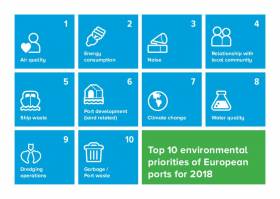Displaying items by tag: Greenport Congress
Environmental Report from ESPO Focuses On Top 10 Environmental Priorities In European Ports
#Ports&Shipping- The annual Environmental Report for 2018 (download) published by the European Sea Ports Organisation (ESPO) was presented yesterday at the GreenPort Congress in Valencia, Spain.
The ESPO Environmental Report includes environmental performance benchmark indicators as well as the Top 10 Environmental Priorities (download postcard) of the European ports for 2018.
Air quality has remained the top priority of the European ports since 2013. The increased interest in the relationship with local community in position 4 of the list is relevant as air quality has been increasingly a concern for citizens of port cities and urban areas.
Climate change is becoming of high relevance for European ports. It made it in the Top 10 for the first time in 2017 and climbed to the position 7 in 2018. Almost eight out of ten European ports take into consideration climate change when they develop new infrastructure projects. Furthermore, 59% of ports strengthen the climate resilience of existing infrastructure and 41% of them have already dealt with operational challenges due to climate change.
Marine litter-related priorities went also higher in the Top 10 list compared to last year. Waste was the most monitored issue increased by 17% since 2013. This indicates the readiness of ports to contribute to addressing the issue of marine litter.
73% of the ports are certified under an environmental standard (ISO, EMAS, PERS) increased by 19% since 2013, while 68% of them make their environmental report publicly available. On the development of alternative fuels infrastructure, the report finds that 24% of the ports provides high voltage shore-side electricity for ships at berth and 30% of them with LNG refueling points, while another 24% is currently developing LNG infrastructure projects.
“ESPO publishes its annual ‘check-up’ for the European ports, the benchmark indicators, which become a point of reference for the environmental performance of the sector. The report will be a good source of information for all interested stakeholders, local communities, civil society, researchers and industry.
On alternative fuels infrastructure, we see increased investments on the port side but we believe that related port investments would accelerate if the remaining barriers for uptake are addressed. For instance, energy taxation on electricity has been a significant barrier for the uptake of shore-side electricity for ships, being often the reason why it does not make a strong business case.
We are aiming to include more indicators in the report of next year. We also encourage all ports to join EcoPorts in order to improve their environmental performance, better communicate their environmental policy and broaden the sample of ports that feed into the annual benchmark performance of the sector.” says ESPO’s Secretary General, Isabelle Ryckbost.
The data for the report was obtained from the responses of 90 EU ports to the EcoPorts Self Diagnosis Method (SDM), a tool developed for identifying and monitoring environmental risk and establishing priorities for action and compliance (www.ecoports.com). The SDM is updated by EcoPorts’ members every two years.
Cork Among Ports to Receive Recognition for High Environmental Standards
#GreenportAwards – At the GreenPort Congress in Barcelona held last week, the European Sea Ports Organsition (ESPO) was delighted to congratulate the ports of Cork, Calais and Moerdijk for achieving the Port Environmental Review System (PERS) certification.
ESPO Chairman Santiago Garcia Mila presented the PERS certificates to the port representatives, Mr Finbarr Kearney (Cork), Mr Laurent Devulder (Calais), and Mr Jacco Rentrop (Moerdijk) respectively.
ESPO would like to pay particular tribute to the three ports for being amongst the most faithful supporters and ambassadors of the EcoPorts tools and approach.
The ports of Cork and Moerdijk achieved PERS certification for the fourth consecutive time since their initial certifications in 2006.
Calais received its certificate for the third time in a row since its initial commitment to PERS in 2010.
PERS is the only port sector specific environmental management standard. It is the flagship product of the EcoPorts network and is offered as part of ESPO services to its members through the EcoPorts website: www.ecoports.com
Compliance with the PERS standard is independently assessed by Lloyd's Register Quality Assurance and the certificate has a validity of two years. There are currently 20 ports in Europe that hold a valid PERS certificate.
ESPO is delighted with the increased interest shown to PERS by European port authorities and encourages all ports within its membership to implement the scheme and receive a certification.






























































